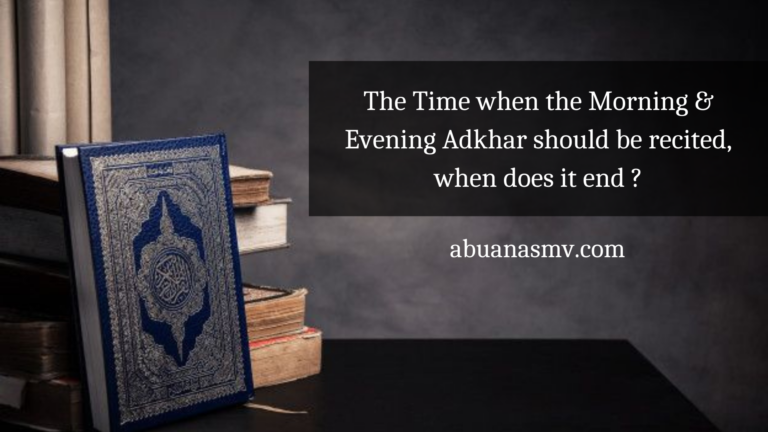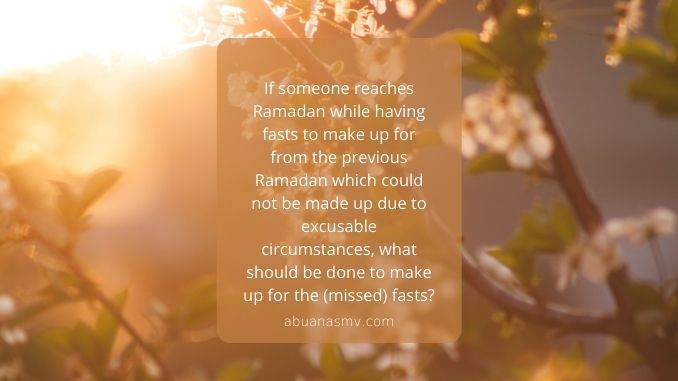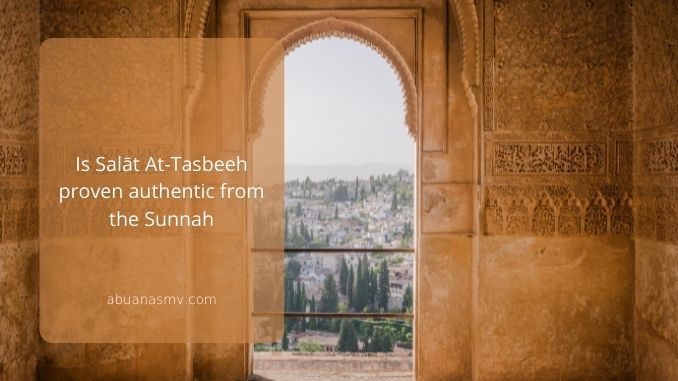Can someone who has fasts pending from Ramadan fast the optional fasts of Shawwal
بسم الله الرحمن الرحيم ، الحمد لله رب العالمين، و الصلاة و السلام على رسول الله – صلوات الله و سلامه عليه- وعلى آله و صحبه أجمعين.
أما بعد:
With regards to the question about fasting in Shawwal while one has missed fasts from Ramadan,
Firstly: It is important to know the rewards and blessings of fasting the 6 days of Shawwal. In the Hadeeth in Saheeh Muslim, the Prophet ﷺ said,
(مَنْ صامَ رمضانَ ثُمَّ أَتْبَعَهُ ستًّا مِنْ شوَّالٍ كانَ كصيامِ الدَّهْرِ)
“Whoever fasted Ramadan and followed that with six days of Shawwāl, it is like he has fasted the whole of the year.”
صحيح مسلم (1164 )
Secondly: Can someone fast the optional days of Shawwal whilst having missed fasts to make up from the previous Ramadan?
There are two opinions held by the scholars regarding this.
The first opinion is that it is not permissible to fast the days of Shawwal without making up the missed fasts from Ramadan. This is the opinion of the Hanabila (Hanbali madh-hab). And among the scholars who have cited this opinion include: Ash-Sheikh ibn Baaz, Ash-Sheikh ibn Uthaymeen, Ash-Sheikh Sālih al-Fawzān and others. The evidence they present include,
The Prophet ﷺ said,
(مَنْ صامَ رمضانَ ثُمَّ أَتْبَعَهُ ستًّا مِنْ شوَّالٍ كانَ كصيامِ الدَّهْرِ)
“Whoever fasted Ramadan and followed that with six days of Shawwāl, it is like he has fasted the whole of the year.” صحيح مسلم 1164
The statement in the Hadeeth “..fasted Ramadan and followed that …” indicates that there is a sequence to this.
That is, to fast the days of Shawwal after fasting the days of Ramadan. If someone has missed 10 fasts in Ramadan, it is said that he has fasted only part of Ramadan. It cannot be considered as having fasted Ramadan and after that having fasted the days of Shawwal.
The scholars have also said the evidence supports the completion of the fasts of the month of Ramadan first. It is only after that the Sunnah fasts should be fasted. Otherwise, the person will not be someone who achieves the reward mentioned in the Hadeeth.
And they have further mentioned that the obligatory actions are the actions most loved by Allāh. The optional actions of worships come after that. Therefore, an obligatory act loved by Allāh and a means of drawing nearer (to Him) cannot be left off to perform optional acts of worship.
Uthman bin Mawhib said, Abu Huraira رضى لله عنه was asked, ”I have some fasts that I missed from Ramadan. Can I fast the first 10 days of Dhul Hijja while I have them pending?
Abu Huraira رضى لله عنه said, “No, why (do you fast optional fasts while you have obligatory fasts)? Start fulfilling the rights of Allāh first. After that you can fast the optional fasts if you wish.”
البيهقي في السنن الكبرى ٨٣٩٥ صحيح
Al-Imām Ibn Rajab al-Hanbali رحمه الله said,
”Unless a person fasts all the fasts of Ramadan and then follows it by the 6 days of Shawwal, they will not have achieved the objective of fasting the 6 days of Shawwal.“
اللطائف223
The second opinion: Those who say that the person who has missed fasts to make up from Ramadan can still fast the 6 days of Shawwal.
From the evidence provided regarding this view, the saying of ’Aaisha رضى لله أنها who said:
(كان يكون علي الصوم من رمضان فما أستطيع أن أقضيه إلا في شعبان)
’There were fasts from Ramadan that I missed. I was not able to make up those fasts except during the month of Sha’baan.“
صحيح البخاري 1950
The scholars of the second opinion have said, ”Given the status and virtue of ’Aaisha رضى لله أنها, how can one say that she did not fast the days of Shawwal?“ (Meaning, if it is said that the Sunnah fasts cannot be fasted while the missed fasts of Ramadan remain, can it then be inferred that ‘Aisha رضى لله أنها did not fast the days of Shawwal because she stated that she could not make up the missed fasts of Ramadan until Sha’ban arrived?)
And in response to this, the scholars say that the Prophet ﷺ’s wife ’Aaisha رضى لله أنها was occupied in an act of worship that is superior to (optional) fasting during Shawwal. She was engaged in fulfilling her obligations to the Messenger ﷺ, in his service.
That is an act of worship far superior. According to the rules of Shari’ah, if two statements contradict, (in this case fasting optional fasts and engaging in the service of the Prophet ﷺ) then that which is superior of the two is to be considered. This became the reason for which she delayed making up the missed fasts of Ramadan until Sha’ban. Thus, this addresses the proof presented by the Scholars who hold the second opinion.
It is further said, about ’Aaisha رضى لله أنها, that it was not in her ways to fast the optional fasts while she had missed fasts from Ramadan. She did not say, ”I fast the optional fasts“. However, what she said was, ”I defer making up the missed fasts of Ramadan so as to remain occupied in the service of the Prophet ﷺ.“ And the narration does not state that she was given the permission to fast optional fasts either. What is clear here is that she delayed the fasts for the sake of the needs and services of the Prophet ﷺ.
Therefore, to summarise,
(مَنْ صامَ رمضانَ ثُمَّ أَتْبَعَهُ ستًّا مِنْ شوَّالٍ كانَ كصيامِ الدَّهْرِ)
”Whoever fasted Ramadan and followed that with six days of Shawwāl, it is like he has fasted the whole of the year.“
From the wording of this Hadeeth, and other evidence presented, it is evident that the opinion that states that a person should not fast the days of Shawwal without first making up the missed fasts from Ramadan, and if one does so he will not get the reward of fasting the whole year through, is a very strong opinion. And this opinion has credible proofs.
However, it should be noted that among those Scholars who hold this opinion, Al-Allamah ibn Uthaymeen رحمه الله has mentioned that those who are faced with circumstances of necessity, due to those circumstances they are permitted to fast the 6 days of Shawwal while there are fasts pending from Ramadan.
In this regard, the Sheikh said, “A woman who has missed fasts from Ramadan, should not fast the days of Shawwal without making up the missed fasts from Ramadan. That is because the Prophet ﷺ said,
(مَنْ صامَ رمضانَ ثُمَّ أَتْبَعَهُ ستًّا مِنْ شوَّالٍ كانَ كصيامِ الدَّهْرِ)
”Whoever fasted Ramadan and followed that with six days of Shawwāl, it is like he has fasted the whole of the year.“ صحيح مسلم 1164
Therefore, the one who has pending fasts from Ramadan will not be considered as one who has completed the fasts of Ramadan. So, unless she completes the fasts of Ramdan and then fasts the days of Shawwal she will not get that reward. She takes the whole month of Shawwal to make up the missed fasts of Ramadan. For instance, now consider a woman who could not fast on any day of Ramadan due to post-natal bleeding (nifas). So, she starts fasting in the month of Shawwal to make up the missed fasts. And she cannot complete the missed fasts until during the month of Dhul Qaida. In this case, the woman can fast the 6 days of Shawwal. She will get the reward of fasting the 6 days of Shawwal. That is because she did so out of necessity, being one with excusable circumstances.
And Allah knows best. This is a very just ruling on this and the best opinion that reconciles all the proofs. The women who missed their fasts due to menstruation cannot be given the same ruling if she has the capability to fast the missed days from Ramadan and then fast 6 days of Shawwal, all during the month of Shawwal. Upon them is to make up the missed fasts and then follow that with the 6 days of Shawwal.والله تعالى أعلم. وصلى الله على نبينا محمد وآله وصحبه وسلم.







